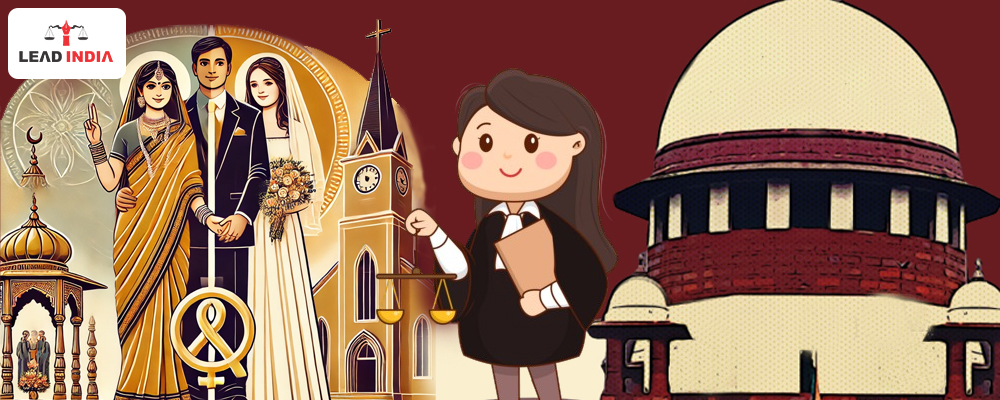Marriages between individuals from different religions, including between Hindus and Christians, have become more common in today’s diverse society. While love knows no boundaries, interfaith marriages, particularly between Hindus and Christians in India, can raise legal, social, and religious questions. In this blog, we will examine the legal framework, options for marriage, and the challenges couples may face when entering an inter-religious union.
Legal Framework for Inter-Religious Marriages in India
In India, inter-religious marriages are permitted under the Special Marriage Act of 1954, which provides a legal framework for marriages between people of different religions without requiring either party to convert. The law is secular, ensuring that both individuals can retain their respective religions while being legally married. This is particularly helpful for couples who wish to avoid the complexities and obligations of religious conversion or participating in religious ceremonies that don’t align with their beliefs.
Need A Legal Advice
The internet is not a lawyer and neither are you. Talk to a real lawyer about your legal issue

The Special Marriage Act provides several advantages, including the following:
- It allows a civil marriage, which does not require any religious ceremonies.
- It ensures that the marriage is legally valid, regardless of the religious background of either party.
- It does not force either party to abandon their religious identity, thus maintaining their religious freedom.
To marry under this Act, both parties must meet certain conditions:
- They must be of sound mind.
- They must be of legal age (21 years for males, 18 years for females).
- They must not be married to someone else.
Can a Hindu Marry a Christian?
Yes, a Hindu can legally marry a Christian under the Special Marriage Act of 1954, provided both parties consent and fulfill the necessary legal requirements. However, the couple has to choose a secular wedding ceremony instead of a traditional Hindu or Christian religious ceremony. This means the marriage would not follow the religious rites and rituals of either faith but would be governed by the civil provisions of the Special Marriage Act.
Marriage Procedure Under the Special Marriage Act
- Notice of Intended Marriage: Both parties must file a Notice of Intended Marriage with the Marriage Registrar at least 30 days before the marriage date. This notice is displayed publicly, allowing anyone to raise objections during this waiting period.
- Objection Period: If no objections are raised within the 30-day period, the marriage can proceed. If there are objections, the couple may have to attend a hearing to address the concerns.
- Marriage Registration: If no objections are filed or the issues are resolved, the marriage is registered in the presence of a Marriage Officer and three witnesses. The couple receives an official marriage certificate, which makes the union legally valid.
Cultural and Social Considerations
While interfaith marriages may be legally permissible, cultural and societal acceptance can still be challenging. In many cases, families may object to such unions due to traditional beliefs or concerns about the couple’s future religious practices. Here are a few tips for managing such situations:
- Involve Families Early: Engaging both families in the discussion early on can help clear any misunderstandings. Open discussions about religion and traditions can reduce resistance and create a mutual understanding.
- Counseling and Support: Couples can seek guidance from community organizations, interfaith support groups, or marriage counselors. These resources can help manage cultural or familial opposition and offer emotional and legal support.
- Respect and Adaptability: It is essential for both partners to respect each other’s religious beliefs and practices. Participation in each other’s religious ceremonies or celebrating both partners’ religious festivals can promote understanding and respect.
Challenges and Solutions for Interfaith Marriages
Inter-religious marriages can face unique challenges beyond legalities, such as:
- Religious Differences: Couples may face dilemmas about religious rituals, customs, and child-rearing.
- Cultural Clashes: Cultural and social expectations might differ significantly between the two communities.
To navigate these challenges:
- Open Communication: Constant dialogue about each partner’s expectations and how to balance both religions is vital.
- Legal Guidance: Couples should seek legal advice to ensure that their rights are protected, particularly regarding property, inheritance, and other legal matters.
- Religious Tolerance: Participation in both religious practices (if desired) can lead to a harmonious blending of traditions.
Recent Legal Developments and Judgments
In 2023, the Supreme Court of India reaffirmed that interfaith marriages are protected under the Constitution, emphasizing the right to marry freely irrespective of religion. The Court also highlighted that conversion is not a requirement for a valid interfaith marriage under the Special Marriage Act, and individuals should not face coercion to change their religion as part of the marital process. This ruling strengthened the legal framework for interfaith couples, ensuring more protection against coercive or forced conversions.
Conclusion
A Hindu and a Christian can marry legally in India without either party needing to convert, thanks to the Special Marriage Act of 1954. The marriage can be registered as a civil union, maintaining the religious identity of both individuals. While the legal process is straightforward, cultural and familial challenges may arise, which requires communication, understanding, and sometimes outside support.
For those contemplating interfaith marriages, it’s essential to consider both the legal and emotional aspects of the union.
One can talk to a lawyer from Lead India for any kind of legal support. In India, free legal advice online can be obtained at Lead India. Along with receiving free legal advice online, one can also ask questions to the experts online free through Lead India.





 Talk to a Lawyer
Talk to a Lawyer